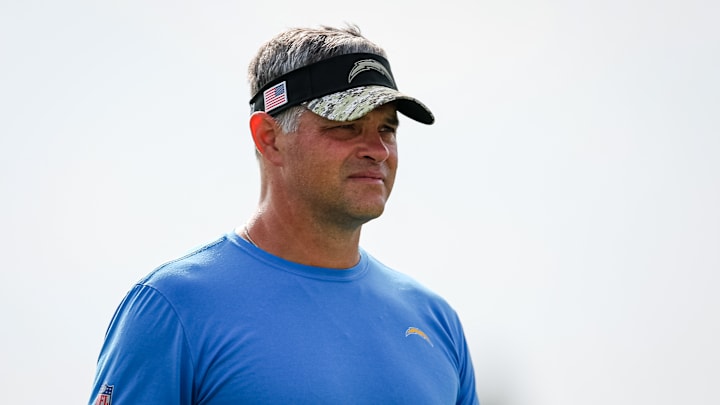The LA Chargers defeated the Las Vegas Raiders 24-19 in Week 1 in a game that really had no business being as close as it was. The Chargers were leading this game 17-3 at halftime and 21-10 in the third quarter with the defense giving the team every opportunity to slam the door shut.
The Chargers' defense forced three turnovers in the second half alone and all the Chargers needed to do was piece together one long scoring drive to essentially put the game on ice. Instead, the offense completely stalled out after Justin Herbert put the team up 21-10 in LA's first drive of the third quarter.
After that touchdown strike from Herbert to Gerald Everett, the Chargers' drives went as follows: three-and-out, three-and-out, missed field goal (18-yard drive), three-and-out, end of game. There is no excuse for that kind of offensive performance against a not-great Raiders defense, especially after seeing Justin Herbert march down the field up to that point.
Is it time to panic and completely rewrite the playbook? Obviously not. There are a lot of things in this playbook that obviously work. But the Chargers would be doing a disservice if they didn't make adjustments to optimize the offense.
Joe Lombardi and the Chargers need to address the play-calling in Week 1.
Lombardi went to the much more traditional run-run-pass play-calling style once the Chargers had a big second-half lead. Despite stressing an ethos of dominating their opponents, the Chargers seemed more concerned with milking the clock than taking it to the Raiders.
Yes, most offensive coordinators would do something similar in this situation. However, Lombardi got plenty of advice that this wasn't working and that did not really change how he called the plays in big spots.
At the end of the third quarter, the Chargers ran it twice before attempting a third and five pass that went incomplete. The incomplete pass was well past the first-down marker and if converted, would have also converted a second and seven. So why not pass it, or at least run an RPO, on second down to give Herbert another chance at passing the sticks?
In the ensuing drive, Austin Ekeler saved the Chargers from a safety on a first-down hand-off and then the Chargers attempted two passes. While the team did not pick up the first down, it would have if Tre' McKitty did not drop a wide-open pass on second down. The pass was still far more effective than the run.
After picking up a first down (with a second-down pass and then a gadget play on third down), Lombardi went back to run-run-pass on the new set of downs. Sony Michel went six yards, negative one yard and then an incomplete pass. The Chargers attempted a 49-yard field goal and missed. If made, the Chargers' lead would have gone from 11 to 14 points.
While it does make a difference, it still is just a two-score lead at the end of the day. If the Chargers were so intent on running out the clock here, they should have run the ball again on third down and then gone for it on fourth down. Another minute would have been drained and they would have had a shorter fourth-down attempt (in theory) than the fourth and five.
If that was not the intent then pass the ball on second and four, or at least run an RPO.
I understand that the Chargers are trying to bank on having an improved offensive line and good run game but when something does not work they have to adjust. They especially have to adjust when they have one of the best quarterbacks in the entire sport who just marched down the field earlier in the game.
MUST-READ: Ranking Justin Herbert and all 32 starting quarterbacks
The Chargers gave Herbert absolutely no favors by mostly throwing the ball on third down when the Raiders could adjust their personnel to attack the pass. The Bolts averaged just 2.5 yards per carry yet they continued to try and force the ground game when it wasn't there.
